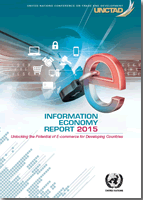The new economy is perhaps even more critical for emerging and developing markets, but the infrastructure and regulatory environment may be lagging. More needs to be done to move e-commerce to the front of the economic priority list, from logistics to supportive governments. These are some of the key observations and recommendations of the UN Conference on Trade and Development (UNCTAD) in its Information Economy Report: “Unlocking the Potential of E-Commerce for Developing Countries.”
Business to Consumer
There is also a B2C (Business-to-Consumer) E-commerce Index in the Linked Report. According to UN News Centre, such draws on data to assess e-commerce readiness and help States to formulate their national e-commerce strategies. Through the Index, governments can identify their relative strengths and weaknesses. In Africa, for example, internet penetration levels need to rise to promote e-commerce readiness. Education and skill development of citizens is also a needed foundation. “As the digital economy expands and more business activities are affected, it becomes more important for governments to consider policies that can help to harness e-commerce for sustainable development,” UNCTAD Secretary-General Mukhisa Kituyi comments.
Is Facebook part of Answer?
Facebook has just announced a range of new initiatives which could become the foundation for a broader and deeper e-commerce. Facebook Messenger will now be capable of fund transfers and consumating other commercial transactions. However, many Internet giants have a desire to dig for greater profits via e-commerce. What sets Facebook apart, and perhaps a few others as Google, is the stated intention and developing capacity to reach most global citizens now technologically cut-off, particularly those in developing economies.
Protecting Internet Freedom Balancing Regulation to Presumably Aid E-Commerce
One area of concern is the inclination of some governments to rationalize greater controls over media, communication among citizens and suppression of alternative as well as dissident political views on the stated objective of improving and making a more secure the Internet. Read – “Come to the Virtual Atlantis!“
Making information and communications technology work for development requires more than expanding the infrastructure, the Report indicates. In order to foster productive and inclusive use of information and communications technology, governments need to create legal, institutional, and policy frameworks and generate the necessary skills in government, business, and civil society, and the Index measure’s progress in those areas. Also See: “The Interview – Digital Diplomacy , a Battlefield or Marketplace of Ideas?“





Pingback: viagra online order()
Pingback: cialis 5mg()
Pingback: cialis 5mg()
Pingback: cialis coupons()
Pingback: Buy cheap viagra now()
Pingback: Usa viagra sales()
Pingback: cialis online canada()
Pingback: cialis()
Pingback: cialis for sale()
Pingback: cialis price walmart()
Pingback: viagra 50mg()
Pingback: erection pills()
Pingback: non prescription erection pills()
Pingback: ed meds online()
Pingback: canada online pharmacy()
Pingback: generic cialis online()
Pingback: levitra 20mg()
Pingback: vardenafil online pharmacy()
Pingback: real money online casinos usa()
Pingback: gambling casino online()
Pingback: viagra generic()
Pingback: online casino real money us()
Pingback: casinos online()
Pingback: buy cialis pills()
Pingback: online loans()
Pingback: payday loans online()
Pingback: payday loans()
Pingback: viagra prescription()
Pingback: esports betting sites()
Pingback: online casino for real cash()
Pingback: cialis internet()
Pingback: 20 cialis()
Pingback: new jersey casinos online gambling()
Pingback: casino online usa()
Pingback: new cialis()
Pingback: wind creek casino online games()
Pingback: generic cialis()
Pingback: new cialis()
Pingback: generic for cialis()
Pingback: viagra online prescription free()
Pingback: real money online casino()
Pingback: best online casino for money()
Pingback: casino games online()
Pingback: buying viagra online()
Pingback: viagra for sale()
Pingback: online viagra()
Pingback: viagra online()
Pingback: generic viagra()
Pingback: cialis buy cialis online()
Pingback: cheap viagra generic()
Pingback: buy viagra online usa()
Pingback: buy viagra pills()
Pingback: cialis 10mg()
Pingback: buy viagra now()
Pingback: buy viagra online fast shipping()
Pingback: cialis 5 mg()
Pingback: buy viagra australia()
Pingback: cheapest viagra on line()
Pingback: when to take viagra()
Pingback: tadalafil canadian pharmacy()
Pingback: online casino gambling()
Pingback: real online casino()
Pingback: buy viagra new york()
Pingback: viagra by mail safely()
Pingback: best online website to buy viagra with no prescription()
Pingback: cheapest place to buy real viagra()
Pingback: hydroxychloroquine price in india()
Pingback: how to buy cialis()
Pingback: cheapest Viagra 200 mg()
Pingback: viagra prices()
Pingback: cost of Viagra 200 mg()
Pingback: cialis online()
Pingback: Cialis 60mg cheap()
Pingback: viagra price()
Pingback: viagra coupons()
Pingback: viagra substitute()
Pingback: Cialis 60mg pharmacy()
Pingback: viagra online()
Pingback: cheapest generic viagra()
Pingback: order viagra online()
Pingback: how to buy allopurinol 300mg()
Pingback: amaryl 4 mg cost()
Pingback: cialistodo.com()
Pingback: antabuse 250mg tablets()
Pingback: buy viagra online()
Pingback: antivert 25 mg online pharmacy()
Pingback: viagra soft pills()
Pingback: walgreens cialis price()
Pingback: viagra for sale in ireland()
Pingback: bactrim 400/80 mg coupon()
Pingback: buy sildenafil citrate 100mg online()
Pingback: benicar 20mg tablets()
Pingback: order cialis online without prescription()
Pingback: Biaxin 500 mg no prescription()
Pingback: Premarin 0,3mg purchase()
Pingback: cialis dapoxetine()
Pingback: sildenafil cost walmart()
Pingback: strong viagra 100mg()
Pingback: cialis 20mg()
Pingback: where can i buy catapres 100mcg()
Pingback: ceclor 500 mg no prescription()
Pingback: ceftin tablets()
Pingback: celebrex 200 mg tablet()
Pingback: celexa 20mg medication()
Pingback: tadalafil 20mg()
Pingback: cephalexin 500 mg coupon()
Pingback: cipro cheap()
Pingback: claritin 10mg otc()
Pingback: real money casino()
Pingback: legitimate online slots for money()
Pingback: hollywood casino online()
Pingback: real money casino games()
Pingback: best online casino for money()
Pingback: rivers casino()
Pingback: real money online casinos usa()
Pingback: doubleu casino()
Pingback: play casino()
Pingback: best online casino()
Pingback: compare car insurance quotes()
Pingback: allstate car insurance()
Pingback: cheapest car insurance quotes ever()
Pingback: women viagra pills coupons()
Pingback: best auto and home insurance companies()
Pingback: insurance car insurance()
Pingback: car insurance online()
Pingback: abc car insurance()
Pingback: active ingrediant in viagra()
Pingback: inexpensive car insurance quotes()
Pingback: personal car insurance()
Pingback: average car insurance()
Pingback: Free viagra()
Pingback: online personal loan lenders()
Pingback: fast payday loans()
Pingback: payday loan advance()
Pingback: installment loans()
Pingback: get viagra prescription online()
Pingback: quick loan online()
Pingback: bad credit loans in ga()
Pingback: fast payday loan()
Pingback: online personal loans texas()
Pingback: cbd oil for sale cheap()
Pingback: abouted()
Pingback: cherry flavored cbd oil()
Pingback: viagra professional canada()
Pingback: does hemp oil contain cbd()
Pingback: cbd oil for pain management()
Pingback: canadian pharmacy viagra scam()
Pingback: can you buy viagra over the counter in europe()
Pingback: cbd oil and fingolimod()
Pingback: cbd oil benefits and uses()
Pingback: order viagra online canada()
Pingback: cbd oil benefits webmd()
Pingback: canadian pharmacy viagra 150 mg()
Pingback: cbd book distributors()
Pingback: hemp cbd oil benefits()
Pingback: define assignations()
Pingback: walmart viagra()
Pingback: custom essay writing()
Pingback: female viagra prescription()
Pingback: fast essay writing service()
Pingback: write a college essay()
Pingback: united airline seat assignment()
Pingback: buy essay papers()
Pingback: federalist paper writers()
Pingback: homework research()
Pingback: sildenafil 50 mg tablet()
Pingback: uspto assignments database()
Pingback: website dieses benutzers besuchen()
Pingback: cheapest cleocin()
Pingback: clomid 50mg price()
Pingback: buy viagra()
Pingback: clonidine 0,1 mg australia()
Pingback: Generic viagra online()
Pingback: how to buy clozaril 50mg()
Pingback: colchicine online()
Pingback: cheap symbicort inhaler 160/4,5mcg()
Pingback: cialis in dubai()
Pingback: combivent usa()
Pingback: coreg online pharmacy()
Pingback: generic cialis()
Pingback: Buy cheap viagra online()
Pingback: compazine nz()
Pingback: coumadin 2mg otc()
Pingback: buy viagra in the uk()
Pingback: cozaar medication()
Pingback: dissertation assistance service()
Pingback: crestor coupon()
Pingback: national junior honor society essay help()
Pingback: writing essays custom()
Pingback: cymbalta uk()
Pingback: thesis data analysis()
Pingback: research papers help()
Pingback: write my persuasive paper()
Pingback: help with thesis writing()
Pingback: dapsone caps over the counter()
Pingback: ddavp 10mcg no prescription()
Pingback: depakote united states()
Pingback: order diamox 250mg()
Pingback: differin cheap()
Pingback: Viagra pfizer()
Pingback: diltiazem no prescription()
Pingback: doxycycline without prescription()
Pingback: dramamine 50mg coupon()
Pingback: buy elavil()
Pingback: erythromycin 500 mg online pharmacy()
Pingback: etodolac uk()
Pingback: flomax 0,4 mg tablets()
Pingback: flonase nasal spray australia()
Pingback: geodon nz()
Pingback: hyzaar tablets()
Pingback: imdur 60mg generic()
Pingback: how to buy imitrex()
Pingback: imodium 2 mg nz()
Pingback: viagra generic name()
Pingback: navigate to this website()
Pingback: imuran tablet()
Pingback: indocin usa()
Pingback: how to buy lamisil 250mg()
Pingback: levaquin otc()
Pingback: how to buy lopid()
Pingback: lopressor 50 mg pharmacy()
Pingback: luvox online pharmacy()
Pingback: macrobid 50 mg no prescription()
Pingback: cost of meclizine 25 mg()
Pingback: buying viagra thur mail()
Pingback: highest rated canadian pharmacies()
Pingback: mestinon medication()
Pingback: canadian pharmacy viagra()
Pingback: where can i buy micardis 80 mg()
Pingback: buy medication without an rx()
Pingback: mobic 15 mg usa()
Pingback: canadian pharmacy no prescription()
Pingback: cost of nortriptyline()
Pingback: generic viagra cipla()
Pingback: periactin 4mg for sale()
Pingback: phenergan online()
Pingback: plaquenil 200mg uk()
Pingback: prednisolone generic()
Pingback: prevacid pills()
Pingback: prilosec 10mg pharmacy()
Pingback: proair inhaler prices()
Pingback: cost of procardia()
Pingback: order proscar()
Pingback: order protonix 40 mg()
Pingback: provigil online pharmacy()
Pingback: where to buy pulmicort()
Pingback: pyridium australia()
Pingback: reglan coupon()
Pingback: remeron 30mg tablet()
Pingback: retin-a cream canada()
Pingback: revatio 20mg pills()
Pingback: cheap risperdal 1 mg()
Pingback: robaxin 500mg prices()
Pingback: rogaine without a doctor prescription()
Pingback: cost of seroquel()
Pingback: how to buy singulair 10 mg()
Pingback: skelaxin 400mg without a doctor prescription()
Pingback: spiriva 9mcg without prescription()
Pingback: tenormin 100mg usa()
Pingback: cheapest thorazine 50mg()
Pingback: toprol canada()
Pingback: tricor 160 mg tablet()
Pingback: valtrex uk()
Pingback: verapamil 40mg coupon()
Pingback: voltaren 50mg usa()
Pingback: wellbutrin united kingdom()
Pingback: discount cialis online()
Pingback: order zanaflex()
Pingback: click now()
Pingback: zocor 5 mg medication()
Pingback: zovirax uk()
Pingback: how to buy zyloprim()
Pingback: cost of viagra 100mg()
Pingback: cheapest zyprexa 2,5mg()
Pingback: cheap zyvox 600mg()
Pingback: sildenafil usa()
Pingback: tadalafil 40 mg pills()
Pingback: furosemide without prescription()
Pingback: escitalopram 5mg uk()
Pingback: aripiprazole 15 mg united kingdom()
Pingback: cost of pioglitazone()
Pingback: spironolactone 100 mg medication()
Pingback: fexofenadine 120mg cheap()
Pingback: glimepiride tablets()
Pingback: meclizine medication()
Pingback: leflunomide pharmacy()
Pingback: atomoxetine 18mg pills()
Pingback: donepezil 5mg otc()
Pingback: anastrozole 1mg australiawhere to buy anastrozole()
Pingback: irbesartan without a doctor prescription()
Pingback: dutasteride 0,5mg online pharmacy()
Pingback: olmesartan australia()
Pingback: buspirone purchase()
Pingback: clonidine united states()
Pingback: cefuroxime 250 mg over the counter()
Pingback: daily cialis reviews()
Pingback: celecoxib pills()
Pingback: citalopram tablets()
Pingback: order generic cialis online 20 mg 20 pills()
Pingback: cheapest ciprofloxacin()
Pingback: how to buy loratadine 10mg()
Pingback: cheap generic cialis in the us()
Pingback: clindamycin 150mg uk()
Pingback: clozapine online()
Pingback: can buy viagra equivalent at usa walmart over the counter()
Pingback: prochlorperazine over the counter()
Pingback: carvedilol 6.25mg tablet()
Pingback: warfarin 2mg coupon()
Pingback: order original cialis online()
Pingback: rosuvastatin 20mg medication()
Pingback: cheap desmopressinmg()
Pingback: divalproex 500mg pharmacy()
Pingback: trazodone online()
Pingback: cheap tolterodine 1mg()
Pingback: acetazolamide without a prescription()
Pingback: fluconazole no prescription()
Pingback: how to buy phenytoin 100mg()
Pingback: oxybutyninmg tablets()
Pingback: doxycycline 100mg online pharmacy()
Pingback: bisacodyl coupon()
Pingback: what works like viagra()
Pingback: how to buy venlafaxinemg()
Pingback: amitriptyline 10mg online()
Pingback: permethrin otc()
Pingback: how long for cialis to take effect()
Pingback: erythromycin uk()
Pingback: wgnsckcd()
Pingback: estradiol 2mg online()
Pingback: tamsulosinmg online()
Pingback: fluticasone 50mcg australia()
Pingback: how to buy viagra uk()
Pingback: wat kost cialis 10 mg()
Pingback: how many doses of ivermectin to cure scabies()
Pingback: glipizide 10mg usa()
Pingback: is viagra generic()
Pingback: isosorbide uk()
Pingback: sumatriptan 25mg usa()
Pingback: is there such thing as generic cialis()
Pingback: loperamide no prescription()
Pingback: propranolol united states()
Pingback: viagra meaning()
Pingback: order lamotrigine()
Pingback: terbinafine tablets()
Pingback: where to buy levofloxacin 500mg()
Pingback: where to buy levothyroxine mcg()
Pingback: augmentin 875 mg 125 mg tablet price()
Pingback: buy furosemide uk()
Pingback: buy azithromycin with no prescription()
Pingback: ivermectin lotion 0.5()
Pingback: ventolin online usa()
Pingback: gemfibrozil 300mg without a prescription()
Pingback: where can i buy metoprolol()
Pingback: doxycycline monohydrate dosage()
Pingback: prednisolone in dogs()
Pingback: cheap clotrimazole()
Pingback: fertility drugs clomid()
Pingback: dapoxetine molecular()
Pingback: diflucan costs()
Pingback: synthroid wiki()
Pingback: essayhelpof.com()
Pingback: uk dissertation writing service()
Pingback: phd no thesis()
Pingback: college essay writers block()
Pingback: results of propecia()
Pingback: neurontin abuse johnnies()
Pingback: metformin gas()
Pingback: paxil recreational()
Pingback: wine with plaquenil()
Pingback: cialis voucher()
Pingback: walmart online pharmacy()
Pingback: ist levitra schädlich()
Pingback: lasix 20 mg price()
Pingback: discount pharmacy online()
Pingback: tinderentrar.com()
Pingback: homemade viagra()
Pingback: how long before cialis takes effect()
Pingback: generic cialis paypal()
Pingback: online doctor prescription for cialis()
Pingback: whats better cialis viagra or levitra()
Pingback: priligy 60 mg cost()
Pingback: albuterol for cats()
Pingback: new york times hydroxychloroquine()
Pingback: hydroxychloroquine coronavirus in humans()
Pingback: hydroxychloroquine antiviral mechanism()
Pingback: drug store pharmacy technician pay()
Pingback: viagra without ed()
Pingback: when does cialis go off patent()
Pingback: where can i purchase hydroxychloroquine online()
Pingback: Actos()
Pingback: https://regcialist.com/()
Pingback: ivermectil antibiotic()
Pingback: priligy hydrochloride tablet()
Pingback: stromectol 32 mg()
Pingback: amlodipine and lisinopril()
Pingback: fluoxetine anti depressants()
Pingback: can duloxetine cause sore nipples in men()
Pingback: viagra 100mg()
Pingback: lisinopril hydrochlorothiazide side effects()
Pingback: sildenafil viagra()
Pingback: free viagra()
Pingback: zoloft breastfeeding()
Pingback: sildenafil 100mg()
Pingback: sildenafil()
Pingback: cialis pharmacy()
Pingback: cialis 20 mg tablet()
Pingback: tamoxifen escitalopram 20 mg tablet()
Pingback: cialis mg()
Pingback: prednisone classification()
Pingback: cialis 20 mg daily use()
Pingback: womens viagra()
Pingback: viagra online prescription()
Pingback: plaquenil same as penicillin()
Pingback: buying viagra online()
Pingback: ivermect 375 uses()
Pingback: cialis 20()
Pingback: female viagra()
Pingback: order sildenafil us()
Pingback: vaigra()
Pingback: amoxicillin and potassium()
Pingback: cialis without prescription()
Pingback: sildenafil generic()
Pingback: cost of propecia ireland()
Pingback: viagra()
Pingback: where to buy cialis pills()
Pingback: prednisone 30g()
Pingback: best generic viagra()
Pingback: ivermectin contraindications()
Pingback: cialis 30 mg price()
Pingback: best sildenafil brand generic()
Pingback: ivermectin for sale online()
Pingback: where can i get viagra in canada()
Pingback: ivermectin on ebay 50ml()
Pingback: tadalafil 5mg price()
Pingback: 300 mg viagra()
Pingback: ivermectinin without prescription canada()
Pingback: cialis by mail()
Pingback: zithramax allergy rash()
Pingback: over the counter viagra in usa()
Pingback: ventolin inhalers wo prescription()
Pingback: female viagra in red bull prank()
Pingback: does blue cross and blue shield cover the cost of viagra()
Pingback: milatary cost for viagra()
Pingback: generic for cialis()
Pingback: tadalafil citrate()
Pingback: z pack safe for pregnancy()
Pingback: best site to buy viagra uk()
Pingback: viagra cock()
Pingback: can you take lisinopril and diphenhydramine()
Pingback: natural viagra()
Pingback: priligy generika dapoxetine forum()
Pingback: azithromycin 500mg over the counter()
Pingback: zithromax over the counter()
Pingback: pfizer viagra()
Pingback: need a prescription for viagra()
Pingback: viagra pills for men()
Pingback: pfizer viagra price()
Pingback: viagra dosages()
Pingback: natural alternatives to viagra()
Pingback: buy amoxicilin 500 mg()
Pingback: lasix 20 mg daily()
Pingback: gabapentin tablets()
Pingback: cheap plaquenil()
Pingback: prednisone 40mg pills()
Pingback: priligy online()
Pingback: cheap modafinil()
Pingback: ivermectin 0.1()
Pingback: albuterol 0.021()
Pingback: zithromax 250()
Pingback: viagra online kaufen()
Pingback: furosemide 45 mg()
Pingback: sildenafil uk otc()
Pingback: neurontin 800 mg()
Pingback: cheap viagra()
Pingback: effects of plaquenil()
Pingback: cost of ivermectin()
Pingback: buy albuterol india()
Pingback: viagra connect walgreens()
Pingback: cost of zithromax()
Pingback: herbal viagra()
Pingback: cialis versus viagra()
Pingback: viagra sildenafil()
Pingback: ivermectin 500mg()
Pingback: over the counter viagra()
Pingback: cialis daily()
Pingback: cialis reviews()
Pingback: cialis buy india()
Pingback: pictures of generic cialis()
Pingback: stromectol uk buy()
Pingback: stromectol 3mg()
Pingback: generic cialis buy uk()
Pingback: buy viagra online in india()
Pingback: cheap generic viagra pills()
Pingback: ivermectina en ingles()
Pingback: ivermectin 1%()
Pingback: can i buy ventolin over the counter in uk()
Pingback: flccc website()
Pingback: latisse eyebrows()
Pingback: flccc ivermectin()
Pingback: tamoxifen cheap()
Pingback: merck molnupiravir()
Pingback: olumiant 1mg()
Pingback: zanaflex uk()
Pingback: buy clomid usa()
Pingback: front line doctors new website()
Pingback: ivermectin kaufen schweiz()
Pingback: ivermectin 8000()
Pingback: ivermectin 12()
Pingback: ivermectin 3mg pill()
Pingback: ivermectin 6 tablet()
Pingback: ivermectin for sale()
Pingback: ivermectin tablets for sale()
Pingback: ivermectin for humans()
Pingback: stromectol for sale()
Pingback: ivermectin tablets()
Pingback: ivermectin treatment for covid()
Pingback: ignition casino ndb()
Pingback: ivermectin()
Pingback: prednisone 20mg pills()
Pingback: tadalafil prix()
Pingback: https://tadalafiled.quest()
Pingback: provigil uk order()
Pingback: ivermectin 10 ml()
Pingback: buy red viagra()
Pingback: generic cialis medication()
Pingback: where can i order generic viagra online()
Pingback: ivermectin lotion for lice()
Pingback: cialis walmart()
Pingback: tadalafil from canada to usa()
Pingback: purchase sildenafil pills()
Pingback: us generic cialis()
Pingback: cheap daily cialis online()
Pingback: sildenafil pronounce()
Pingback: ivermectin buy online()
Pingback: buy sildenafil pills from canada()
Pingback: sildenafil tablets for men()
Pingback: cialis with dapoxetine()
Pingback: generic cialis prescription()
Pingback: generic cialis buy uk()
Pingback: apo prednisone 20mg()
Pingback: buy prednisone for pets()
Pingback: cost of generic cialis()
Pingback: cialis prescription australia()
Pingback: merck pill()
Pingback: cialis tadalafil()
Pingback: cialis canada for sale()
Pingback: walmart cialis()
Pingback: ivermectin dosing()
Pingback: prednisone()
Pingback: sildenafil without a prescription()
Pingback: what is cialis()
Pingback: best online casino()
Pingback: buy viagra online()
Pingback: ivermectin brand()
Pingback: ivermectin usa price()
Pingback: real money casino online()
Pingback: cialis online in us()
Pingback: what is cialis()
Pingback: where can i order generic viagra()
Pingback: tadalafil otc()
Pingback: ivermectin for rosacea()
Pingback: how much is a cialis prescription()
Pingback: mectin ivermectin()
Pingback: average cost of cialis prescription()
Pingback: how to order ivermectin online()
Pingback: buy ivermectin 12mg for humans()
Pingback: ivermectin 3 mg tablet price()
Pingback: ivermectin 2mg()
Pingback: generic ivermectin for humans()
Pingback: oral ivermectin cost()
Pingback: ivermectin 12mg for sale()
Pingback: ivermectin 6mg over the counter()
Pingback: buy ivermectin online()
Pingback: ivermectin tabletten für menschen kaufen()
Pingback: lasix 100mg online()
Pingback: ivermectin 6mg online()
Pingback: buy lasix uk()
Pingback: where to get ivermectin()
Pingback: ivermectin buy nz()
Pingback: stromectol ivermectin 3 mg()
Pingback: stromectol merck()
Pingback: ivermectin 4()
Pingback: is there a generic cialis available?()
Pingback: lucky land()
Pingback: mectin ivermectin()
Pingback: where to get hydroxychloroquine()
Pingback: ivermectin structure()
Pingback: ivermectin antiviral()
Pingback: generic ivermectin()
Pingback: walmart cialis()
Pingback: buy stromectol ivermectin()
Pingback: buy stromectol 12mg()
Pingback: stromectol 3 mg dosage()
Pingback: walmart pharmacy()
Pingback: ivermectin buy online()
Pingback: where can i get hydroxychloroquine()
Pingback: Can a uterus be transplanted to a man buy levitra 20mg?()
Pingback: How do you treat an infection naturally buy ivermectin?()
Pingback: Are antibiotics effective against viruses stromectol online pharmacy?()
Pingback: How long will it take him to miss me levitra buy?()
Pingback: How does a urologist examine you for erectile dysfunction vardenafil 10 mg?()
Pingback: How many miles is 10000 steps online levitra?()
Pingback: What's the best good morning text levitra prescription?()
Pingback: Medications and Skin Conditions - Restoring Dermatological Health ventolin inhaler side effects?()
Pingback: The Latest Advancements in Medicine Bring Hope for Improved Health buy ivermectin online?()
Pingback: Medications and Seasonal Allergies - Finding Relief from Pollen and More where can you buy dapoxetine in store?()
Pingback: Medications and Asthma Control - Breathing Freely, Living Fully dapoxetine usa?()
Pingback: Medications and Seasonal Flu Prevention - Strengthening Immunity what are viagra pills used for?()
Pingback: Can erectile dysfunction be a result of radiation therapy for prostate cancer Cenforce pills?()
Pingback: What is an IUI baby Cenforce for sale online?()
Pingback: What vitamins make you harder Cenforce 50mg over the counter?()
Pingback: How can I be romantic to my boyfriend over text buy Cenforce 50mg generic?()
Pingback: Breaking Barriers - Access to Affordable Medications for All vidalista online?()
Pingback: Medications and Respiratory Health - Breathing Easy for a Healthier Life plaquenil 200 mg tablet sanofi?()
Pingback: What is the potential of robotic surgery in various medical specialties buy lasix 100mg sale?()
Pingback: Medications - Navigating the Challenges of Polypharmacy in Seniors order furosemide 40mg online?()
Pingback: How are teledermatology services contributing to the timely diagnosis and treatment of skin conditions buy furosemide 20 mg over the counter?()
Pingback: Medications and Fertility - Empowering Family Planning buy fildena 100mg generic?()
Pingback: Precision Nutrition - Eating for Your Genes cheap generic viagra french kamagra?()
Pingback: Achieving Better Health - How Medications Can Make a Difference fildena 25 mg?()
Pingback: Medications and Heart Disease Prevention - Guarding the Pumping Power what is hydroxychloroquine 200 mg used for?()
Pingback: How do you know if a man is still fertile best price on genuine kamagra in stock in usa?()
Pingback: Medications - Unlocking New Possibilities in Disease Management cefadroxilo costo?()
Pingback: Medications and Skin Protection - Shielding against Environmental Aggressors synthroid 137 mcg tablet?()
Pingback: How many hours apart should you take antibiotics 2 times a day flagyl costco?()
Pingback: Can antibiotics be used to treat infections in patients with infected burn wounds and septicemia stromectol pill?()
Pingback: How can I check my sperm count low at home generic viagra over the counter?()
Pingback: What is the main cause of ED Cenforce 100mg usa()
Pingback: How long does it take to get a fatty liver back to normal buy stromectol over the counter()
Pingback: Should you walk with congestive heart failure buy lasix without prescription()
Pingback: Cenforce online order()
Pingback: stromectol 12mg online()
Pingback: Can a baby have 3 fathers??()
Pingback: How do you please a man's heart??()
Pingback: dapoxetine 60 mg india()
Pingback: dapoxetine 30 mg tablet online purchase in india()
Pingback: amoxi 750 n1()
Pingback: ventolin hfa 90 mcg inhaler recalls()
Pingback: vardenafil 20mg()
Pingback: androgel 1.62()
Pingback: dapoxetine 60()
Pingback: vidalista 20 underdosed()
Pingback: vilitra 10mg()
Pingback: fildena 50mg over the counter()
Pingback: androgel packets()
Pingback: testosterone hormone gel()
Pingback: Can antibiotics be used to treat infections in patients with compromised kidney function hydroxychloroquine for arthritis?()
Pingback: fildena tablet price()
Pingback: Anonymous()
Pingback: vidalista-20 directions()
Pingback: order fildena 100mg for sale()
Pingback: Cenforce 200 side effects()
Pingback: clomid for sale()
Pingback: buy Cenforce()
Pingback: albuterol nebulizer()
Pingback: men on viagra videos()
Pingback: vidalista images()
Pingback: cenforce 200()
Pingback: order fildena pill()
Pingback: fildena 20()
Pingback: vidalista 80 kopen()
Pingback: priligy 60 mg()
Pingback: cenforce 100 kullanД±cД± yorumlarД±()
Pingback: clomid 50mg price()
Pingback: clomiphene()
Pingback: clomid Generic()
Pingback: clomiphene citrate for men()
Pingback: clomiphene for men()
Pingback: viagra with dapoxetine review()
Pingback: dapoxetine 60 mg price online()
Pingback: kamagra 50mg()
Pingback: kamagra()
Pingback: super vidalista()
Pingback: buy vidalista online()
Pingback: vidalista uses in hindi()
Pingback: advair diskus coupon()
Pingback: vidalista 10()
Pingback: buy advair diskus()
Pingback: cenforce kopen belgie()
Pingback: order cenforce online()
Pingback: buy cenforce 150()
Pingback: Sildenafil 25 mg mexico()
Pingback: Sildenafil online()
Pingback: buy fildena 100()
Pingback: fildena 150mg extra power()
Pingback: fildena cheap()
Pingback: buy furosemide 20 mg over the counter()
Pingback: ventolin mini inhaler()
Pingback: Cenforce 200 amazon gift card()
Pingback: buy fildena 150()
Pingback: stromectol mites()
Pingback: fildena 100mg canada()
Pingback: dapoxetine usa()
Pingback: buspar generic xanax()
Pingback: clindagel cost()
Pingback: order fildena 50mg generic()
Pingback: buspar generic name()
Pingback: buy cenforce online()
Pingback: fildena 100 online()
Pingback: order sildenafil 100mg for sale()
Pingback: cenforce tablet()
Pingback: vermact 12 10 tablet()
Pingback: iverscab 6 mg()